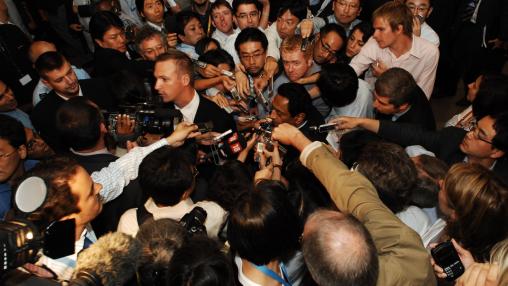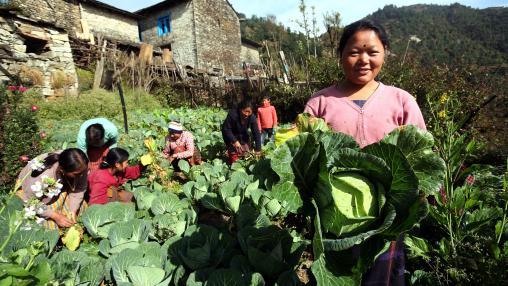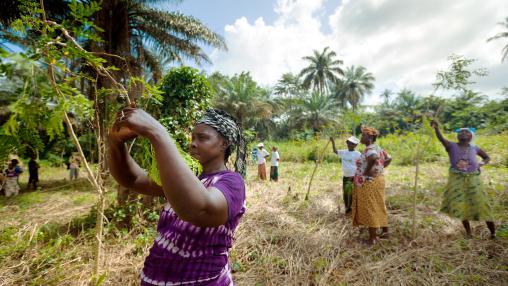
WTO Members Begin Eyeing Options for Doha Work Programme
With the Bali ministerial now behind them, the process to develop a Doha “work programme” by year’s end is beginning to gear up in Geneva, with WTO Director-General Roberto Azevêdo urging members last week to use 2014 to get the struggling negotiations “back on track.”
Two months ago, WTO trade ministers were able to announce their first multilateral deal in nearly 20 years. The Bali package, named after the Indonesian island province where it was agreed, also marked the first deliverables from the Doha Round of negotiations, which have been underway since September 2001.

New U.S. Farm Bill Reaffirms Support to Producers
More protection against low prices, while fixed payments ended
decade-long shift to subsidized crop insurance reinforced
By David Orden, IFPRI
After more than three years of oft-times tumultuous positioning, posturing, and negotiations, the U.S. Congress has passed a new five-year Farm Bill: the Agricultural Act of 2014. The bill, which the President will sign into law on February 7, reaffirms the government’s longstanding support to farmers through 2018.

Toward a Food Secure China
China's food security is being challenged by a mix of factors, including rising demand, rapid urbanization, scarce natural resources and agricultural labor, and greater risk of food safety and environmental problems. To address food security concerns, China had resolved to meet the bulk of its grain demand domestically. But this policy is now being revisited, suggesting a considerable increase in the already rising food imports. The No 1 Central Document released on Sunday reiterated the importance of improving the food security system while ensuring food safety.

Gender and Assets: Closing the Gap
Use, control, and ownership of productive assets – land, money, livestock, and education, to name just a few – are essential stepping stones on the path out of poverty. But this pathway can look very different depending on whether you are a man or a woman. Growing evidence suggests that women typically have fewer assets than men, and that they use those assets differently. What’s more, agricultural development programs may impact men’s and women’s assets in different, sometimes unexpected, ways.

From Subsidies to Direct Cash Transfers for Fertilizer Purchase in India
Fertilizer use in India has exploded since the government began a subsidization program in the 1970s. National fertilizer consumption rates increased by 50% during the 1990s. But research has shown that the effectiveness of these inputs has actually declined – on average, 8 kilograms of grain were produced per kilogram of fertilizer in the late 1990s, compared to 25 kg of grain per kg of fertilizer in the 1960s.

The Future of Public Stockholding
The issue of large-scale public food stockholding programs played a starring role in this month's 9th WTO Ministerial in Bali (for more analysis, read posts by Eugenio Diaz-Bonilla and David Laborde and Luca Salvatici). The resulting ministerial declaration, released on December 7, establishes an interim mechanism that Members can use to navigate the use and management of public food stocks in lieu of a more permanent solution. The declaration calls for a permanent solution to be concluded no later than the 11th Ministerial Conference.

Political Stalemate over EU Biofuel Policy Continues
The “food vs. fuel” debate came no closer to a resolution last week, as Energy ministers from the European Union’s 28 member states failed to agree on a compromise limiting the use of transport fuels made from food crops such as rapeseed and wheat, so-called first generation biofuels.

Healthy Growth Breeds Healthy Growth: Why Childhood Nutrition Programs Are Good for the Economy
If you learned that a $1 investment in your child’s nutritional intake during infancy would ultimately net an $18 return, would you make the investment? Yes, if you had the means, it’s likely you would. It’s a win-win: healthier child, healthier bank account.

What Lies at the End of the Road?
This post is the first in a series of expert opinion pieces on the conclusion of the Bali package.
By David Laborde and Luca Salvatici

Some Ideas to Break the Stalemate on Agricultural Issues at Bali
By Eugenio Diaz-Bonilla, visiting Senior Research Fellow at IFPRI and member of the group on agricultural issues of the E-15 Initiative launched by ICTSD